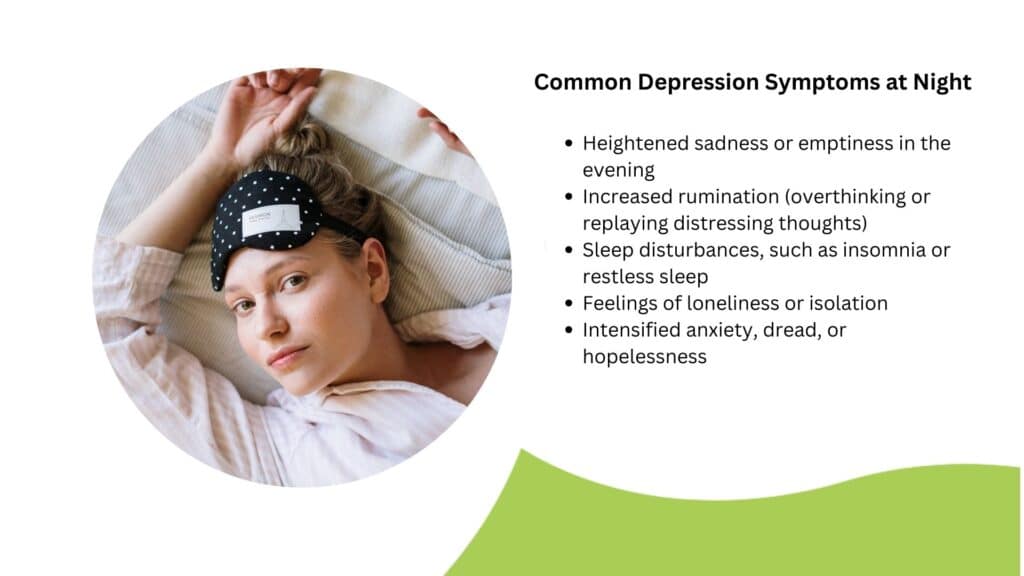
Many people with depression notice that their symptoms intensify in the evening or at night. This phenomenon—sometimes referred to as nocturnal depression—can make it especially hard to fall asleep, unwind, or feel emotionally safe when the day winds down. But why does depression often feel worse at night, and what can be done about it?
What Is Nocturnal Depression?
Nocturnal depression isn’t a formal clinical diagnosis, but it’s a term used to describe a pattern where depressive symptoms peak during nighttime hours. For some people, evenings bring feelings of sadness, hopelessness, or anxiety that are less intense during the day. This nighttime worsening can disrupt sleep and make recovery more challenging.
Common Depression Symptoms at Night
People experiencing nocturnal depression may notice:
- Heightened sadness or emptiness in the evening
- Increased rumination (overthinking or replaying distressing thoughts)
- Sleep disturbances, such as insomnia or restless sleep
- Feelings of loneliness or isolation
- Intensified anxiety, dread, or hopelessness
These symptoms can feel especially overwhelming because nighttime is naturally quieter and more solitary, providing fewer distractions from internal emotional struggles.
Why Depression May Worsen at Night
There’s no single cause for nocturnal depression, but several contributing factors may be at play:
Reduced Distractions
During the day, work, social interaction, or daily tasks can provide structure and temporary relief. At night, with fewer activities and less stimulation, the mind often turns inward, making depressive thoughts harder to ignore.
Circadian Rhythm Disruptions
The body’s internal clock, or circadian rhythm, regulates sleep, hormone release, and mood. When this rhythm is off—due to stress, poor sleep hygiene, or depression itself—it can intensify mood swings and interfere with healthy sleep patterns.
Sleep and Mood Connection
Sleep and mood are closely linked. People with depression often struggle with insomnia or disrupted sleep, which can worsen symptoms. Similarly, poor sleep can impair emotional regulation and make it harder to cope with depressive feelings.
Cognitive Patterns
Nighttime may also invite negative thought patterns like rumination, self-criticism, or regret. These repetitive thoughts can spiral, making symptoms of depression feel more intense just as you’re trying to wind down.

How to Cope With Nighttime Depression
Managing nocturnal depression involves addressing both the emotional and physical components. Here are a few strategies:
- Establish a calming bedtime routine: Try gentle activities like reading, light stretching, or listening to calming music to help transition into rest.
- Limit screen time before bed: Blue light from phones or computers can interfere with melatonin production and sleep quality.
- Create a structured sleep schedule: Go to bed and wake up at the same time each day, even on weekends.
- Practice mindfulness or journaling: These tools can help you release troubling thoughts and reduce nighttime rumination.
- Seek professional support: Talk therapy, medication, or neuromodulation treatments like TMS may help reduce symptoms and improve sleep.
When TMS Therapy May Help
For those experiencing treatment-resistant depression that worsens at night, Transcranial Magnetic Stimulation (TMS) offers a non-invasive, medication-free treatment option. TMS uses targeted magnetic pulses to stimulate parts of the brain involved in mood regulation, such as the prefrontal cortex.
TMS is FDA-approved, safe, and covered by most insurance plans. It doesn’t require sedation or recovery time and avoids the systemic side effects often associated with antidepressants. If your depression intensifies at night and isn’t improving with traditional treatment, TMS may offer a hopeful alternative.
FAQs About Nocturnal Depression
Why does my depression get worse at night?
Reduced distractions, increased rumination, and disrupted sleep patterns can all contribute to worsening symptoms in the evening.
Is nocturnal depression a real diagnosis?
Nocturnal depression isn’t a formal diagnosis, but it describes a real and common experience among people with depression.
Can insomnia cause depression or just make it worse?
Both. Chronic sleep disruption can increase the risk of developing depression and worsen existing symptoms.
How do I know if it’s depression or just nighttime anxiety?
While both can co-occur, depression tends to involve persistent low mood and loss of interest, whereas anxiety centers more on fear or worry. A mental health professional can help differentiate.
What can I do during the night when I feel really low?
Engage in calming activities, avoid caffeine or alcohol, and reach out to someone you trust. If feelings become overwhelming, don’t hesitate to seek professional help.
Does TMS help with nighttime depression specifically?
TMS treats the root causes of depression, which can help alleviate symptoms that worsen at night, especially in people who haven’t found relief with medication.
Should I talk to a doctor if my symptoms are worse at night?
Yes. Worsening symptoms—especially in the evening—can be a sign that your treatment needs adjustment or that additional support is needed.
Schedule Your Complimentary TMS Screening Today
At My TMS Therapy, we’re here to help you restore your energy and joy. Our compassionate team will guide you through every step of the process.
Call us at (877) 548-8081 or contact us online to book your screening today.
Sources:
Mayo Clinic. “Depression (major depressive disorder).”
https://www.mayoclinic.org/diseases-conditions/depression/symptoms-causes/syc-20356007
Sleep Foundation. “How Does Sleep Affect Mental Health?”
https://www.sleepfoundation.org/mental-health
National Institute of Mental Health (NIMH). “Depression.”
https://www.nimh.nih.gov/health/topics/depression
Harvard Health Publishing. “How Much Sleep Do You Actually Need?”
https://www.health.harvard.edu/blog/how-much-sleep-do-you-actually-need-202310302986


